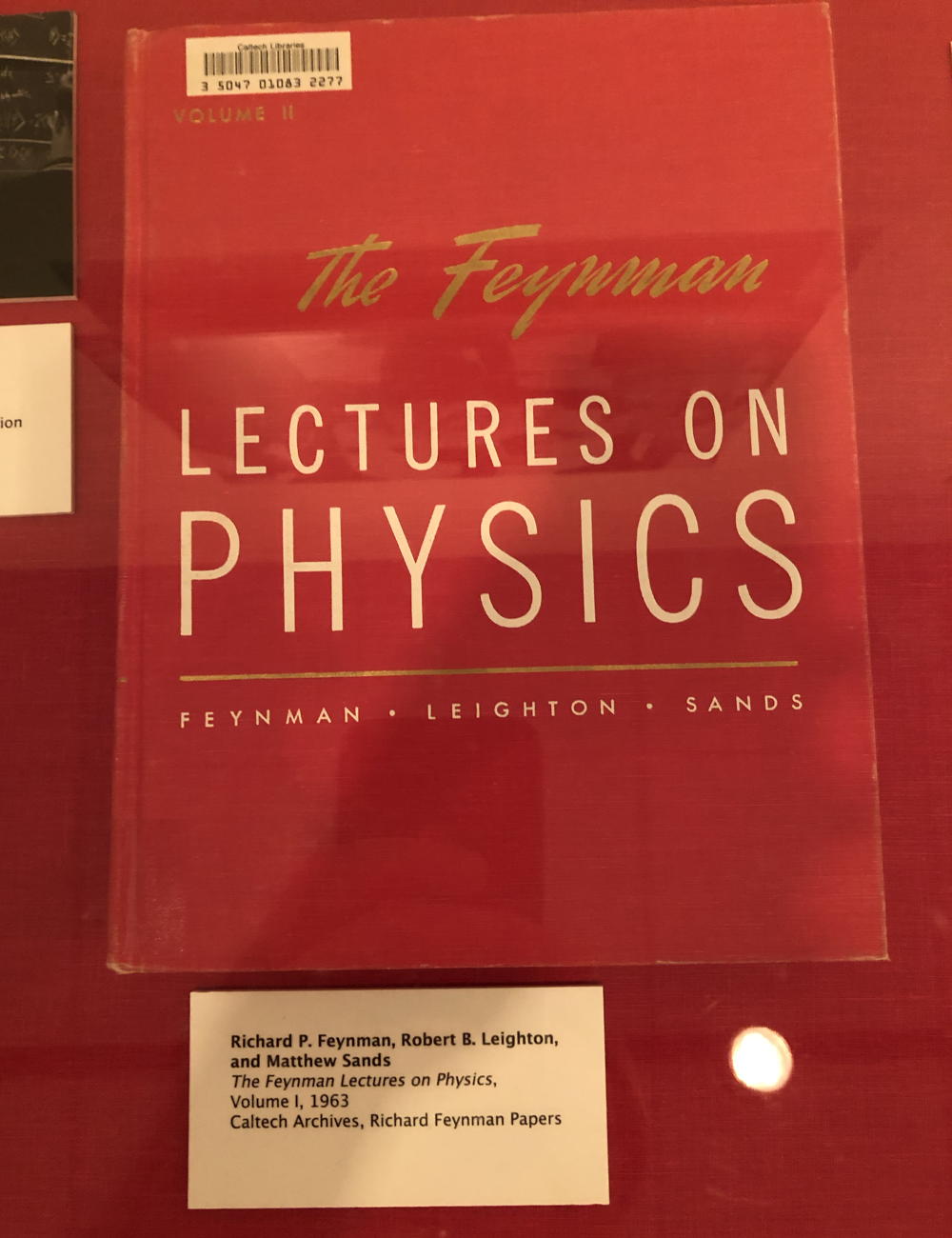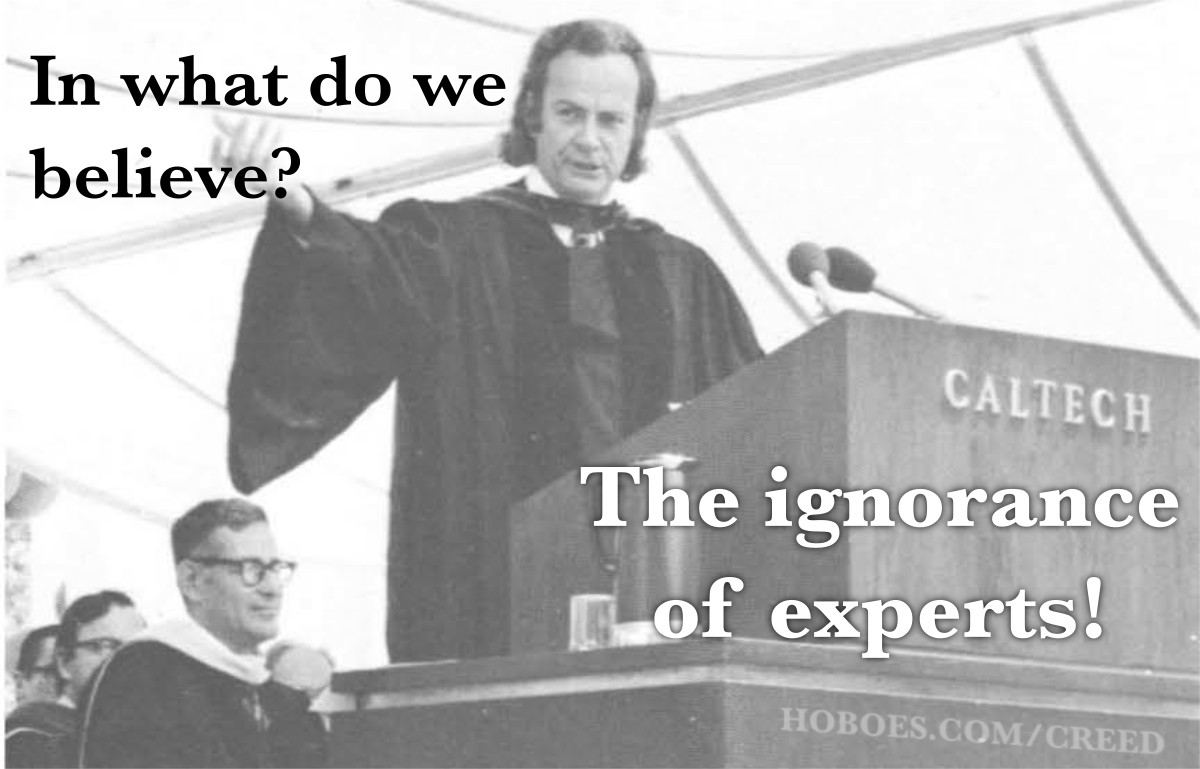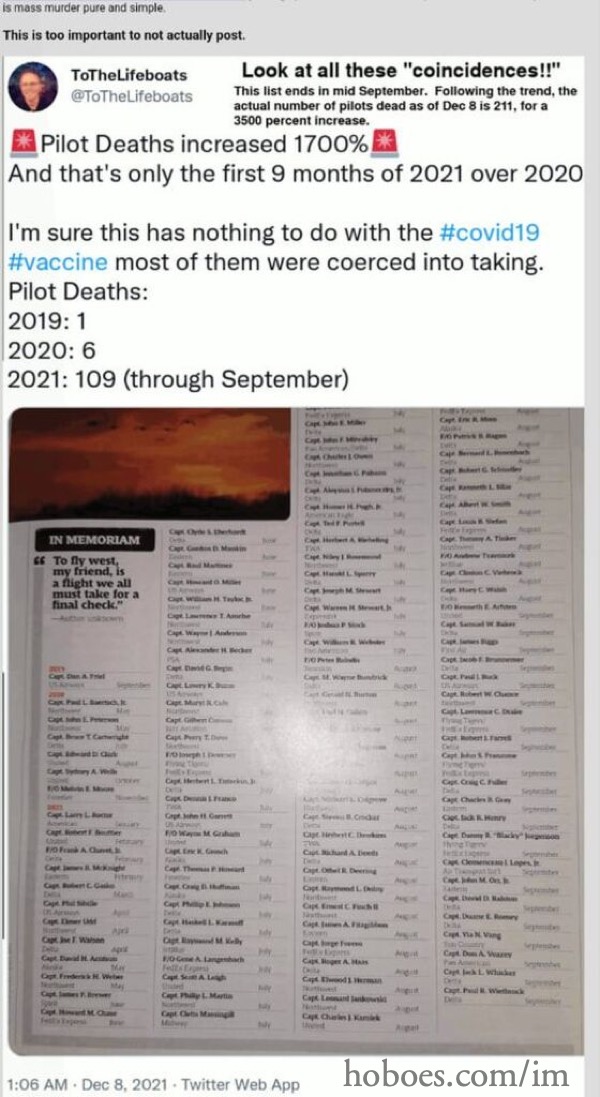The scientific creed

One of the holy books of the religion of science on display at a Caltech chapel.
As one of the holidays of the religion of science approaches—Richard Feynman’s birthday on May 11—I’ve been thinking about science as a belief system for asserting the truth rather than a method for finding the truth.
Do you believe in science? Is science your religion? Sadly, more and more people are treating science more as a religion than as a method even among the science press. Recently I saw a headline on space.com that read “Space-time is swirling around a dead star, proving Einstein right again”.
Even just a few years ago, I still saw recognition in the science press that we are always trying to disprove theories, not trying to prove them. When I first subscribed to Science News, for example, the first relativity-related article I read specifically worded it that that the observations failed to disprove Einstein’s theory, not that they proved it. That’s getting rarer.
There is a critical difference between proving a theory right and failing to prove it wrong, and that difference is the backbone of the modern world. We can always prove a theory right. We just have to stop looking before proving it wrong. But that doesn’t advance civilization, and it’s how a lot of “science” is done today. Start with preconceptions, look only where confirmation can be expected, and stop when that confirmation is found. If even then contradictory evidence is found, just conclude that “The association… is not as simple as we expected.”
Too many researchers today seem to view it as a failure that must be corrected when their observations contradict their theories. That’s the opposite of science. The explicit goal of the scientific method is to disprove the theory. It’s a success to disprove it, not something to be hand waved away.
Instead, science is more and more treated as a religion, with dogmas and decrees that emulate religion rather than science. But what if real science were a religion? What would its ten commandments be?
- I will not trust myself, for I am the most easily fooled.
- I will observe. I will not assume.
- I will theorize.
- I will describe many ways in which my theory can be proven false.
- I will not trust the results of my experiments or observations until they have been repeated by someone I do not trust.
- A government contract is not a substitute for intellectual curiosity.
- I will make my data available, especially to those who disagree with me. They are the ones who will prove my theory wrong.
- I will help those who disagree with me prove my theory wrong.
- I do not seek to be right. I strive to be wrong. With every experiment or observation, I strive to prove my theory wrong.
- The map is not the world: models are theories, and must be treated as theories. I will always share the data on which my model is based and the algorithm on which it is implemented so that when it is wrong it can be shown to be wrong.
Of course, science is not a religion, and those who treat it as religion are not doing science and so would never agree to these commandments of the scientific method. If science were a religion, you could pick a creed that doesn’t make you uncomfortable. You could go from church to church until you find a congregation that appeals to you, that doesn’t deny you or your theories. You could come in only once a year on Newton’s Birthday or Einstein Sunday.
But science is not a religion; we do not have that luxury. We do not care what day Newton was born, or what day Einstein died. Neither date helps advance science. We do not care how many people are in the Science Congregation, or what the Science Pope says, or the Science Synod.

Science is the belief in the ignorance of experts. — Richard Feynman (What Is Science?)
A theory doesn’t become fact just because it’s used to create a model. A model’s purpose is to make predictions based on a theory. When those predictions are wrong, the model is wrong. You can’t change the base assumptions after the fact and then pretend the model was right all long. And yet too often when a model conflicts with reality, the expert who designed it tries to pretend that it’s reality that is really wrong.
Too often, the plural of expert is ignorance.
The scientific version of Matthew 18:20 would be along the lines of, Whenever two or more are gathered in the name of science, I will not trust, for human consensus is easily fooled. Once we start talking about a consensus, we’re talking about, at best, a compromise between truth and falsehood, and, at worst, discarding the actual results of experimental observation. Any compromise between what is true and what is not true is, by definition, not true.
In science, we care only how our theories predict, or fail to predict, repeated and continued experiments and observations.
The first principle is that you must not fool yourself—and you are the easiest person to fool. — Richard Feynman (Surely You’re Joking, Mr. Feynman!•)
We don’t even trust our observations. We can always be proven wrong by the next observation. We strive to prove ourselves and our colleagues wrong by continuing to think of new things we can observe that will prove us wrong. It’s been over a hundred years since Einstein’s theories of relativity and we continue to strive to prove Einstein wrong.
We never are right. We can only be sure we’re wrong. — Richard Feynman (Richard Feynman on Scientific Method (1964))
Science means doing the best we can to prove ourselves wrong and doing the best we can to help others prove ourselves wrong.
Great scientists always seem to be making bets about how they or their friends will be proven wrong. It is the nature of great science.
Details that could throw doubt on your interpretation must be given, if you know them. You must do the best you can—if you know anything at all wrong, or possibly wrong—to explain it. If you make a theory, for example, and advertise it, or put it out, then you must also put down all the facts that disagree with it, as well as those that agree with it. There is also a more subtle problem. When you have put a lot of ideas together to make an elaborate theory, you want to make sure, when explaining what it fits, that those things it fits are not just the things that gave you the idea for the theory; but that the finished theory makes something else come out right, in addition. — Richard Feynman (Surely You’re Joking, Mr. Feynman!•)
If science were a religion, it would be the hardest religion of all. It means making our hard-earned data available to everyone, even the people who disagree with us. Especially the people who disagree with us, because they’re the ones trying hardest to prove us wrong.
And proving ourselves wrong is always our goal.
Go forth, and prove yourself wrong in the name of Science.
- December 15, 2021: In memoriam: vaccinations killing pilots
-

It’s difficult to know what’s real and what’s not real nowadays. No one on any side of any aisle trusts the media to report news correctly, and with good reason. But it remains necessary to have some means of accurately gauging assertions from outside the news media.1
Sometimes, it’s easy to do. But the media’s constant death of x, film at 11 exaggerations have atrophied our ability to see complete hyperbole for the nonsense it is.
“Pilot deaths increased 1700%, and that’s only the first nine months of 2021 over 2020!”
I’m not sure the original memer wasn’t just making this up to see who would spread it around. All the information needed to recognize it as nonsense is in the meme. It quotes a 1700% increase and then says, “that’s just the first nine months!” In other words, according to this meme, pilot deaths likely increased by 2300 percent over 2020.
Think about that for a moment. What would the consequences be of pilots dying at more than 20 times the rate they did last year, and more than 140 times the rate they did in 2019? That’s a lot of deaths, and a lot of planes that can’t be flown. It’s a lot of people who can’t get where they’re going and a lot of packages that can’t be delivered.
You can choose to believe that the major media outlets would try to hush that up. Given how they’re trying to cover up inflation as (a) nonexistent and (b) a good thing, I can’t argue it. But the pilots who have to take over from the dead wouldn’t be able to keep silent. The unions losing members and the airlines losing employees wouldn’t be able to keep silent. You’d almost literally expect planes to be falling out of the sky.
This would be impossible to cover up. This is an industry that’s already suffering a well-publicized shortage of employees. The inflation and supply chain issues we’re seeing today is nothing compared to what we’d be seeing if those numbers represented what the meme says they represent.
- Does government funding hold science back?
- Abundant government funding for research probably has the effect of dividing research into crazy and conventional, with little in between for innovative.
- No way for a man to live: suicide and the bureaucratic state
- Is male (and military) suicide caused by the stranglehold of the bureaucratic state?
- Space-time is swirling around a dead star, proving Einstein right again: Charles Q. Choi
- Space-time is indeed churned by massive rotating bodies, as scientists had thought. (Hat tip to Sarah Hoyt at Heady Stuff February 1, 2020)
More cargo cult science
- Cargo Cult Science
- “When you have put a lot of ideas together to make an elaborate theory, you want to make sure, when explaining what it fits, that those things it fits are not just the things that gave you the idea for the theory; but that the finished theory makes something else come out right, in addition.” Richard Feynman’s famous “cargo cult science”, adapted from the Caltech commencement address given in 1974. Rescued from Donald Simanek’s home page.
- Rudyard Kipling: The Humility of the Plague Doctor
- Charts and graphs are not science. You can get charts and graphs with astrology and biorhythms. Computers can model scientific superstition just as well as they can model real theories. Bloodletting is superstition even if its done in the name of a computer model.
- Should the government (and the CDC) fund research into gun violence?
- Government funded research has held back progress in reducing violence and preventing suicide.
- Did government funding help keep Flint’s water unsafe?
- When researchers rely on government funding to keep their jobs, it should come as no surprise that they aren’t eager to publish findings that reflect badly on those government agencies that fund them.
- Cargo cult climate science
- When your real-world evidence contradicts your theory, that isn’t a boon for deniers; that’s a boon for you, because, if you are a scientist, that is how your scientific knowledge advances. Real scientists are embarrassed when they ignore real-world evidence in favor of a mere theory.
- Seven more pages with the topic cargo cult science, and other related pages
More New Barbarism
- Innovation in a state of fear: the unintended? consequences of political correctness
- Is political correctness poised to literally kill minorities as it may already have killed women, because scientists avoid critical research in order to avoid social media mobs?
- Barbarism and the Global Village
- If we don’t protect our borders, we don’t protect our civilization. When Rome let the barbarians in, they became barbarians.
- Money Changes Everything: Empowering the vicious
- Barbarism empowers the rich, the powerful, the vicious, the strong. Civilization empowers everyone else. Gun control and centralized economies, darlings of the progressive left, have empowered the vicious since the beginning of time. The beltway crowd prefers no competition from people free to barter, or free to defend themselves.
- The new barbarism: A return to feudalism
- The progressive left seems to have no concept of what civilization is, and of what undergirds civilization.
- Science by consensus is barbarism
- The scientific method is pure, distilled civilization. It is completely unnatural.
- 17 more pages with the topic New Barbarism, and other related pages
More Richard Feynman
- Cargo Cult Science
- “When you have put a lot of ideas together to make an elaborate theory, you want to make sure, when explaining what it fits, that those things it fits are not just the things that gave you the idea for the theory; but that the finished theory makes something else come out right, in addition.” Richard Feynman’s famous “cargo cult science”, adapted from the Caltech commencement address given in 1974. Rescued from Donald Simanek’s home page.
More scientific method
- Our Cybernetic Future 1954: Entropy and Anti-Entropy
- In 1954, Norbert Wiener warned us about Twitter and other forms of social media, about the breakdown of the scientific method, and about the government funding capture of scientific progress.
- Climate priests cry wolf one more time?
- In science, if your theory’s predictions don’t happen, you need a new theory. In religion, if your beliefs predict something that doesn’t happen, you just keep moving that prediction further into the future.
- Global warming vs. oiled dolphins
- Catastrophic anthropogenic global warming critics are more dangerous than oil execs who kill dolphins, and need to be buried deeper than two million year old bones. But this makes CAGW a non-science. Science requires criticism or it isn’t science. Science-oriented media outlets are doing CAGW scientists a disservice by protecting them from competing theories.
- The gullible media and the chocolate factory
- Journalists, because of their background and temperament, are specially unsuited to report on science.
